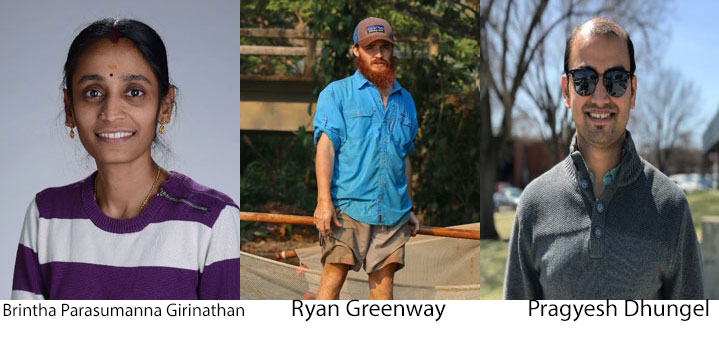May 11, 2018
Outstanding academic and research work at the doctoral level earns three students Sarachek awards
Submitted by Communications and Marketing

Three Kansas State University doctoral candidates have received Sarachek awards for their academic and research achievements.
Pragyesh Dhungel, doctoral candidate in microbiology, Kathmandu, Nepal, was awarded the $17,000 Alvin and RosaLee Sarachek Predoctoral Honors Fellowship in Molecular Biology. Awarded the $2,000 Sarachek Scientific Travel Award were Ryan Greenway, doctoral candidate in biology, Amarillo, Texas, and Brintha Parasumanna Girinathan, doctoral candidate in genetics, Coimbatore, India.
Alvin and RosaLee Sarachek, Wichita, established the fellowship and travel awards to recognize resident graduate students enrolled in a doctoral program at Kansas State University who have demonstrated exceptional research and scholastic accomplishments. An interdisciplinary faculty selection committee determines the fellowship and award recipients. The awards program is offered through the university's Graduate School.
Dhungel received his bachelor's degree from Kathmandu University in Nepal. He studies vaccinia virus, which is used as a live vaccine to eradicate smallpox. Vaccinia, a member of poxvirus family, is presently being engineered to treat various infectious diseases and multiple cancers, and is used as vaccines for diseases such as AIDS, Zika, Ebola, etc. While vaccinia is engineered for many purposes, there is a major gap in understanding the fundamental mechanism of vaccinia gene expression during host protein synthesis shutoff. This is the focus of Dhungel's dissertation research. Zhilong Yang, professor of biology, is Dhungel's major professor.
Dhungel is seeking a postdoctoral position with the federal government or an academic institution. The Sarachek funding will support his travel to attend the XXII International Poxvirus, Asfarvirus and Iridovirus Conference, May 26-30, in Taipei, Taiwan, and relocation expenses when he begins his postdoc position. The remaining funds will be used to generate preliminary data for future grant applications. Dhungel plans to pursue an academic career in teaching and research.
Greenway will use the funds to travel to Tampa, Florida, for the annual meeting of the Society for Integrative and Comparative Biology in January 2019. As an invited speaker, he will present his research on how interactions between mitochondrial and nuclear proteins can play a role in the formation of new species of animals in a special symposium titled "Beyond the powerhouse: Integrating mitonuclear evolution, physiology and theory in comparative biology." By attending this meeting, Greenway can showcase his recent research and interact with prominent biologists as he explores postdoctoral research opportunities.
Girinathan, who plans to graduate in August, will use her travel award to attend the American Society of Microbiology's Microbe International Conference at the Georgia World Congress Centre, Georgia. Attending this conference provides her the opportunity to meet and interact with a diverse group of international researchers who are experts in her area of interest. While at the conference, she will participate in a professional development workshop related to her field. The knowledge she gains will be used to pursue her future career in science.
Alvin Sarachek received his doctorate in genetics from Kansas State University in 1957. He and his wife, RosaLee Sarachek, created the fellowship and travel awards because he values the university's tradition of offering a broad array of quality programs in the life sciences, many with outstanding national reputations. The Saracheks wanted to contribute to the tradition of excellence by recognizing students who have demonstrated exceptional research accomplishments involving molecular approaches to biological problems.
More information on the Sarachek awards is available at k-state.edu/grad/financing/sarachek/.
